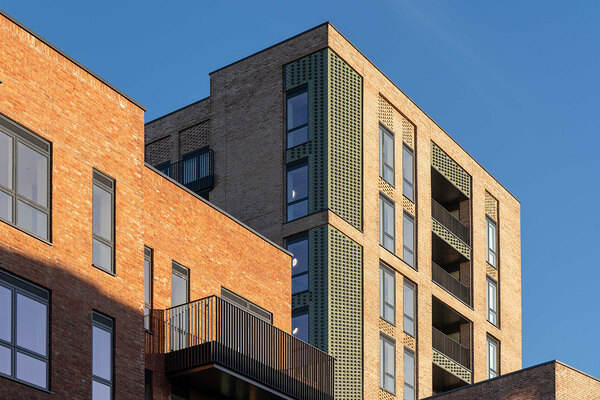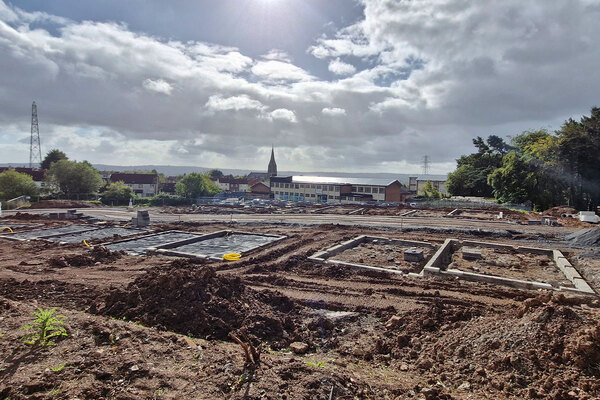You are viewing 1 of your 1 free articles

Learn from the past: housing associations can boost economic growth
The UK faces a difficult few years. Nick Atkin explains how housing associations can help to rebuild the economy
Without wishing to state the blindingly obvious, the UK is facing a difficult few years ahead. Interest rates are at a 14-year high, inflation has reached an eye-watering 11.1% and record energy bills continue to squeeze household incomes. It’s a bleak picture, with the Bank of England warning that the UK faces the longest recession in 100 years, the only saving grace being that it’s predicted to not be as deep as some others we’ve endured.
This is where housing associations can play a key role. During the 2008 downturn, the sector stepped in and kept development going and the construction supply chain moving at a time when house builder activity slowed rapidly.
I can’t help but feel a sense of déjà vu – that feeling that you get when you’ve been in the same situation before. Almost like being in a car crash, when everything feels like it’s happening in slow motion. The difference this time, though, is that we can draw on our experience and tackle what’s to come in a calm and considered way.
The scale of the economic challenge we all face is scary. That’s why those of us who were around during previous economic downturns need to remind those who weren’t that by keeping the construction sector moving, the government has a tried and tested method of stimulating and maintaining economic growth.
We keep building whether the economy is in a time of boom or bust. So it’s right that we acknowledge we have a crucial role to play.
Research by Shelter shows that for every £1 spent on construction, the UK economy benefits by £2.84. Even for someone from Yorkshire that sounds like a cracking deal!
The best time to build more affordable homes and invest in our existing ones is now. So, how can housing associations help boost economic growth? How should the sector respond? And should we stick or twist?
“Mainstream developers are slowing down construction activity and so housing associations are the only ones still building low-cost homes at pace”
More housebuilding creates more jobs and employment opportunities, more demand for skilled workers, and more money working its way through local communities, as well as opportunities for regional growth. Investment in affordable housing also supports the government’s levelling up agenda.
Mainstream developers are slowing down construction activity and so housing associations are the only ones still building low-cost homes at pace. Between 2016 and 2021, housing associations delivered 22.6% of all new housing supply in England, compared with just 4% delivered by local authorities and for-profit providers.
Investment in building more affordable homes brings other added benefits. In areas with greater access to low-cost homes, we see more positive outcomes in health and educational attainment. Building affordable homes also contributes to reducing the government’s £25bn welfare bill. Savings that could be spent elsewhere.
The Affordable Homes Programme (AHP) has been a big step forward in providing certainty over a longer period and enabling us to compete in the land market and grow our development pipelines. However, the value of the AHP is being squeezed by record inflation and even bigger increases in the cost of construction materials. Some providers are now finding the grant they have been allocated does not go as far as was expected just six months ago.
It’s not just more investment that’s needed. Councils across the country need the powers to get building at scale again and deliver housing programmes that can help stimulate economic growth. Overstretched planning departments need better funding to help tackle backlogs that are preventing us getting on with building the affordable homes the country so desperately needs.
The cost of living crisis isn’t going away anytime soon, so we also need to be investing in our existing homes and ensuring they are affordable to live in. That’s why we need to bring back the R word: regeneration.
“Now is the time to invest more in building affordable homes, as well as making our existing homes more energy efficient”
We know that for many places, we have a mismatch between the right homes being in the right places for the right people. Addressing this mismatch can only be achieved through a long-term vision for each place, supported by a funding framework that isn’t just predicated on the supply of new homes.
Now is the time to invest more in building affordable homes, as well as making our existing homes more energy efficient. In housing associations, the government has a proven model for offsetting the impact of an economic downturn, as they are organisations that are committed to investing over the longer term – and that will give local communities a secure future.
In previous economic downturns, housing associations have been able to continue building because of the available funding and the flexibility in how this was used. As we face into the economic headwinds ahead, the government needs to consider not whether it can afford to fund the delivery of more affordable homes and the regeneration of areas where there is a housing mismatch, but whether it can afford not to.
Nick Atkin, chief executive, Yorkshire Housing
Sign up for our development and finance newsletter
Already have an account? Click here to manage your newsletters
Related stories












